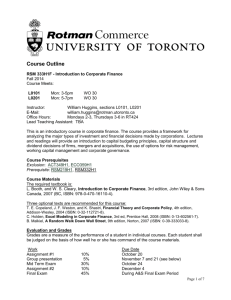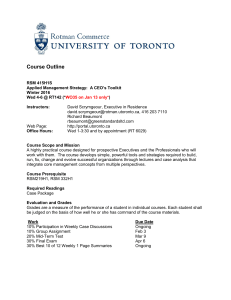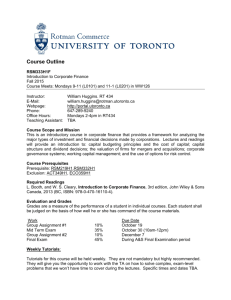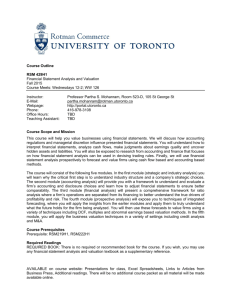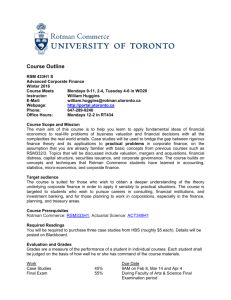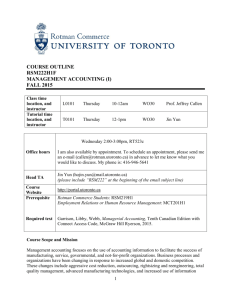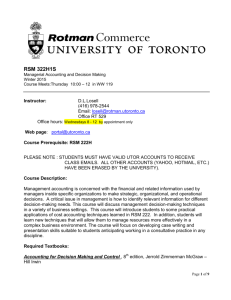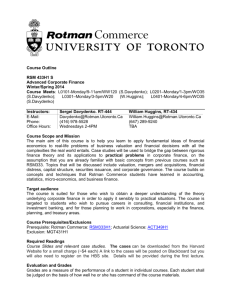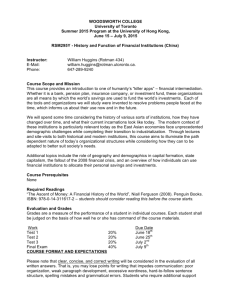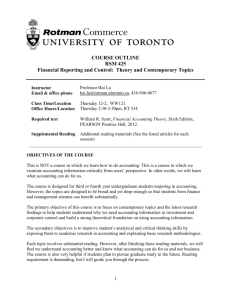RSM 352H1F
advertisement
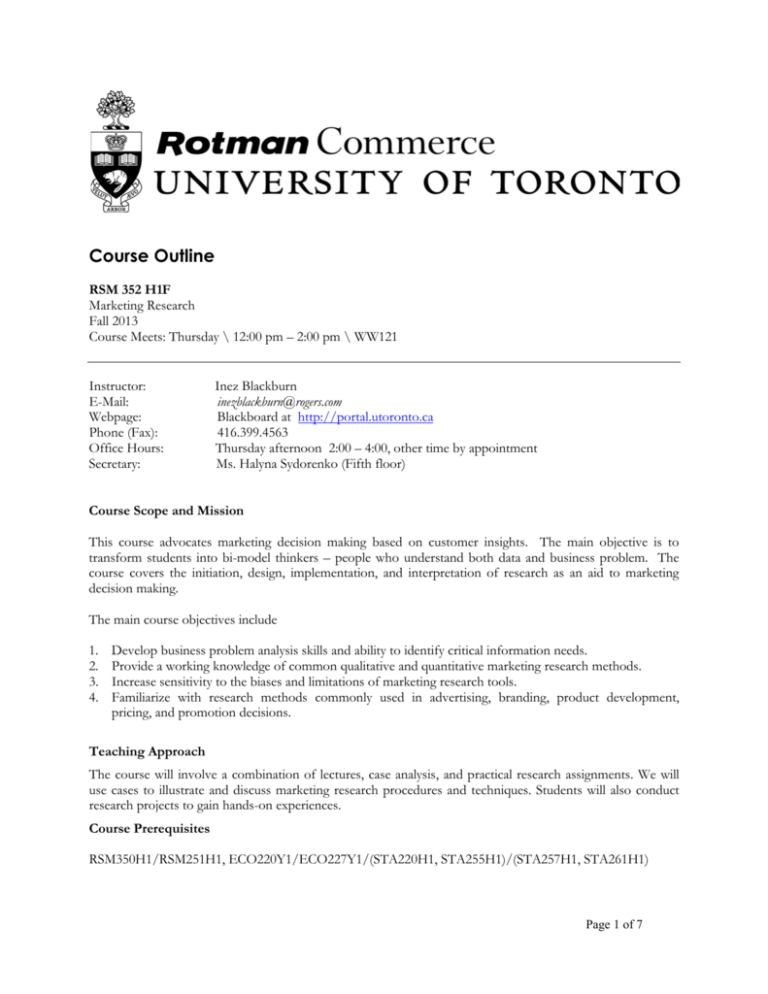
Course Outline RSM 352 H1F Marketing Research Fall 2013 Course Meets: Thursday \ 12:00 pm – 2:00 pm \ WW121 Instructor: E-Mail: Webpage: Phone (Fax): Office Hours: Secretary: Inez Blackburn inezblackburn@rogers.com Blackboard at http://portal.utoronto.ca 416.399.4563 Thursday afternoon 2:00 – 4:00, other time by appointment Ms. Halyna Sydorenko (Fifth floor) Course Scope and Mission This course advocates marketing decision making based on customer insights. The main objective is to transform students into bi-model thinkers – people who understand both data and business problem. The course covers the initiation, design, implementation, and interpretation of research as an aid to marketing decision making. The main course objectives include 1. 2. 3. 4. Develop business problem analysis skills and ability to identify critical information needs. Provide a working knowledge of common qualitative and quantitative marketing research methods. Increase sensitivity to the biases and limitations of marketing research tools. Familiarize with research methods commonly used in advertising, branding, product development, pricing, and promotion decisions. Teaching Approach The course will involve a combination of lectures, case analysis, and practical research assignments. We will use cases to illustrate and discuss marketing research procedures and techniques. Students will also conduct research projects to gain hands-on experiences. Course Prerequisites RSM350H1/RSM251H1, ECO220Y1/ECO227Y1/(STA220H1, STA255H1)/(STA257H1, STA261H1) Page 1 of 7 Course Exclusions MGT453H1/RSM452H1. Required Readings Course Package: This course package includes a set of required readings and cases. 1. 2. 3. 4. 5. 6. 7. 8. 9. 10. 11. 12. 13. 14. 15. Robert L. Dolan (1991), “Marketing Research,” HBS Note (592034-PDF-ENG). 2012 Shopper Experience Study Alan R. Andreasen, “Backward Market Research”, Harvard Business Review, May-June 1985, 176-182. Motorola - WHAT’S DRIVING TOMORROW’S RETAIL EXPERIENCE? Chapter 12 (Designing the Questionnaire, page 308-335) from book: Marketing Research (8th Edition) by D. Aaker, V. Kumar, and G. Day, John Wiley and Sons, ISBN: 0-471-23057-X. Case: The Springfield Nor’easters: Maximizing Revenues in the Minor Leagues (HBS Case 2510) Case: TruEarth Healthy Foods: Market Research for a New Product Introduction (HBS Case 4065) James Raymondo, “Confessions of a Nielson Household,” American Demographics, March 1997, 24-31. Horst Stipp, “How to read Nielson ratings,” American Demographics, March 1997, page 28-29. Reynolds, Thomas and Jonathan Gutman (1988), “Laddering theory, method, analysis, and interpretation,” Journal of Advertising Research, Feb/March. “Red Auerbach on Management – interview by Alan Webber,” Harvard Business Review, March-April 1987. (No. 87201) Gerald Zaltman and Robin Coulter (1995), “Seeing the voice of the customer: Metaphor-based advertising research,” Journal of Advertising Research, July/August, 1995, 35-51. Case: Boston Beer Company: Light Beer Decision (HBS Case 9-899-058) Chapter 5 (Observation, page 203-219) from book: Effective Marketing Research in Canada, by William G. Zikmund and H. Onur Bodur, Nelson Education Ltd. (2008), ISBN: 0-17-625208-8. Almquist, Eric and Gordon Wyner (2001), “Boost Your Marketing ROI with Experimental Design,” Harvard Business Review, October. Evaluation and Grades The course grade will be determined on the basis of: Points Due Dates Course Project 35 points November 28th 2 Individual case reports 30 points October 10th / October 17th /October 24th 1 Individual Practice Assignment 15 points November 28th Class participation (individual) 17 points Ongoing Research participation (individual) 3 points Ongoing Total 100 points Page 2 of 7 (Individual) Written case analysis (30 Points = 2 × 15 Points) Each student needs to hand in at least two case assignments, choose 1 from (The Springfield Nor’easters OR TruEarth Food), and Boston Beer Company. Detailed instructions will be available in class. Due : Case assignments have to be handed in before the beginning of the class. Grading : Your TA will grade your case assignments. Each write up will be graded on a 50-point scale. You can appeal for a grade only if there is a clear misreading of your report. Write a memo explaining your disagreement, and re-submit to the grader. For the first case, if you hand in two case assignments, both assignments will be graded and the maximum of two scores will be counted towards final grade. Late submissions will not be accepted because the case will be discussed in class. If the delay is the result of illness or domestic affliction, the individual involved must contact the instructor BEFORE the assignment is due to explain the position. A medical certificate or other supporting evidence will be required, although if necessary these may follow after the due date. Email submission before class is acceptable only if the student cannot attend the class. (Individual) Practice Assignment (15 Point) Each student needs to hand in a depth interview report. Detailed instructions will be available in class. Late submissions will be accepted but your grades will be discounted at the rate of 10% each day. Grading : The write up will be graded on a 50-point scale. Class Participation (17 Points) These class participation points are given to encourage your active participation in class discussions. The final participation grade will be an average of scores for Attendance and Contribution during the entire semester. Each student should display a name card in first three classes. Attendance: Being present in class is a minimum requirement. Being absent from the lectures, arriving later to the lectures, or leaving early will lower the attendance grades, unless the students have legitimate reasons and notify the instructor in advance. Contribution: Are you a good listener? Do your comments help advance everyone’s learning? Are you willing to interact with others in the classroom? Do your comments show evidence of assimilating and integrating what has been discussed in the course so far? Research Participation (3 Points): Detailed requirement will be available in first class. Group Project: Survey (35 Points): Students will work in groups to complete a survey project during a semester. Detailed instructions will be available in class. Page 3 of 7 Learning to work together in teams is an important aspect of your education and preparation for your future careers. That said, project-based teamwork is often new to students and you are therefore reminded of the following expectations with respect to behavior and contributions to your team project. 1. Read the document entitled, “Working in Teams: Guidelines for Rotman Commerce Students” which is available on the RC portal under the Academic Services tab. 2. When working in a team, Rotman Commerce students are expected to: • Treat other members with courtesy and respect; • Honor the ground rules established by the team; • Contribute substantially and proportionally to the final project; • Ensure enough familiarity with the entire contents of the group project/assignment so as to be able to sign off on it as original work; • Meet the project timeline as established by the team. 3. Resolving differences: Conflicts can – and do – occur. Conflicts are part of the team’s process of learning how to work together effectively and can actually generate exciting debate and creative solutions – if managed appropriately. Student teams are collectively expected to resolve disputes or misunderstandings as soon as they arise (and prior to submission of the final project). In cases where teams are unable to reach a mutually agreeable solution, the entire team must meet with the Rotman Commerce Team Coach** as soon as possible. The Coach will listen to the team and help develop options for improving the team process. All members of the project team must commit to, and, utilize their action plans. ** The Rotman Commerce Team Coach, Nikoleta Vlamis, may be reached at nikoleta@nikoletaandassociates.com for an appointment. Nikoleta is an expert in team dynamics and facilitation. Note that Nikoleta’s role is to provide guidance, support and advice on team matters – not to formally evaluate or assess teamwork for academic purposes. Page 4 of 7 POLICY AND PROCEDURE Missed Assignments Students who miss a test or assignment for reasons entirely beyond their control (e.g. illness) may submit a request for special consideration. Provided that notification and documentation are provided in a timely manner, and that the request is subsequently approved, no academic penalty will be applied. In such cases, students must notify Rotman Commerce on the date of the missed test (or due date in the case of course work) and submit supporting documentation (e.g. Verification of Student Illness or Injury form) to the Rotman Commerce Program Office within one week of the originally scheduled test or due date. Students who do not provide Rotman Commerce or the instructor with appropriate or sufficient supporting documentation will be given a grade of 0 (zero). Note that the physician’s report must establish that the patient was examined and diagnosed at the time of illness, not after the fact. Rotman Commerce will not accept a statement that merely confirms a report of illness made by the student and documented by the physician. For case assignments, the weights of missed assignments will be assigned to other cases. For project, the weights will be assigned to final delivery. Accessibility Needs The University of Toronto is committed to accessibility. If you require accommodations for a disability, or have any accessibility concerns about the course, the classroom or course materials, please contact Accessibility Services as soon as possible: disability.services@utoronto.ca or http://www.accessibility.utoronto.ca/. Course Work & Academic Integrity Academic Integrity is a fundamental value essential to the pursuit of learning and scholarships at the University of Toronto. Participating honestly, respectively, responsibly, and fairly in this academic community ensures that the UofT degree that you earn will continue to be valued and respected as a true signifier of a student's individual work and academic achievement. As a result, the University treats cases of academic misconduct very seriously. The University of Toronto’s Code of Behaviour on Academic Matters http://www.governingcouncil.utoronto.ca/policies/behaveac.htm outlines the behaviours that constitute academic misconduct, the process for addressing academic offences, and the penalties that may be imposed. You are expected to be familiar with the contents of this document. Potential offences include, but are not limited to: In papers and assignments: • Using someone else's ideas or words without appropriate acknowledgement. • Submitting your own work in more than one course without the permission of the instructor. • Making up sources or facts. • Obtaining or providing unauthorized assistance on any assignment (this includes collaborating with others on assignments that are supposed to be completed individually). On test and exams: • Using or possessing any unauthorized aid, including a cell phone. • Looking at someone else's answers • Misrepresenting your identity. • Submitting an altered test for re-grading. Page 5 of 7 Misrepresentation: • Falsifying institutional documents or grades. • Falsifying or altering any documentation required by the University, including (but not limited to), medical notes. All suspected cases of academic dishonesty will be investigated by the following procedures outlined in the Code of Behaviour on Academic Matters. If you have any question about what is or not is permitted in the course, please do not hesitate to contact the course instructor. If you have any questions about appropriate research and citation methods, you are expected to seek out additional information from the instructor or other UofT resources such as College Writing Centres or the Academic Success Centre. Email At times, the course instructor may decide to communicate important course information by email. As such, all UofT students are required to have a valid UTmail+ email address. You are responsible for ensuring that your UTmail+ email address is set up AND properly entered on the ROSI system. For more information please visit http://help.ic.utoronto.ca/category/3/utmail.html Forwarding your utoronto.ca email to a Hotmail, Gmail, Yahoo or other type of email account is not advisable. In some cases, messages from utoronto.ca addresses sent to Hotmail, Gmail or Yahoo accounts are filtered as junk mail, which means that important messages from your course instructor may end up in your spam or junk mail folder. Blackboard and the Course Page The online course page for this course is accessed through Blackboard. To access the course page, go to the UofT Portal login at https://portal.utoronto.ca/ and log in using your UTORid and password. Once you have logged in, look for the My Courses module where you’ll find the link to all your course websites. If you don’t see the course listed here but you are properly registered for the course in ROSI, wait 48 hours. If the course does not appear, go to the Information Commons Help Desk in Robarts Library, 1st floor, for help, or explore the Portal Information and Help at www.portalinfo.utoronto.ca/students and review the Frequently Asked Questions. Recording Lectures Lectures and course materials prepared by the instructor are considered by the University to be an instructor’s intellectual property covered by the Canadian Copyright Act. Students wishing to record a lecture or other course material in any way are required to ask the instructor’s explicit permission, and may not do so unless permission is granted (note: students who have been previously granted permission to record lectures as an accommodation for a disability are, of course, excepted). This includes tape recording, filming, photographing PowerPoint slides, Blackboard materials, etc. If permission is granted by the instructor (or via Accessibility Services), it is intended for the individual student’s own study purposes and does not include permission to “publish” them in anyway. It is absolutely forbidden for a student to publish an instructor’s notes to a website or sell them in any other form without formal permission. Page 6 of 7 Course Timetable Class Date 1 September 12th Introduction 2 September 19th Stats Review 3 September 26th Survey (1) 4 October 3rd Survey (2) 5 October 10th Survey (3) 6 Topic Notes Read: (1.) Note on Marketing Research (2). Backward marketing research 2012 Shopper • Introduction • • Basic data analysis for customer insights Database marketing Guest Speaker NPD Group Keith Barber Survey design • • Survey data analysis Survey application 1: Pricing • • Case discussion Survey application 2: demand forecasting October 17th Survey (4) • • Case Discussion Sampling and media rating 7 October 24th Interview (1) • • Depth interview Motivation research 8 October 31st Interview (2) 9 November 7th Interview (3) • • • • 10 November 14th Interview (4) Guest Speaker Daniel Berkal Language analysis Application of motivation research Projective techniques/ZMET • • Case analysis Ethnography research Due: Case 2 (Boston Beer Company) Reading: Book chapter on Observation 11 November 21st Question (5) • Experimentation Read: Marketing experiment to increase ROI. 12 November 28th • • Project presentation Summary Due: Individual Interview Assignment Due: Group Project • • Case: PG Bank (Blackboard) Read: Note on data analysis (Blackboard). Read: Book chapter on questionnaire design Read: Note on data analysis (Blackboard). WHAT’S DRIVING TOMORROW’S RETAIL EXPERIENCE? Motorola Study Due: Case 1.1 (The Springfield Nor’easters) Due: Case 1.2 (TruEarth Food) Read: 2 articles on Nielsen rating Due: Group project summary (1-page, email) Read: Reynolds and Gutman (1988) on laddering technique. Exercise: “Red Auerbach on Management” Read: Zaltman’s article on ZMET Page 7 of 7
